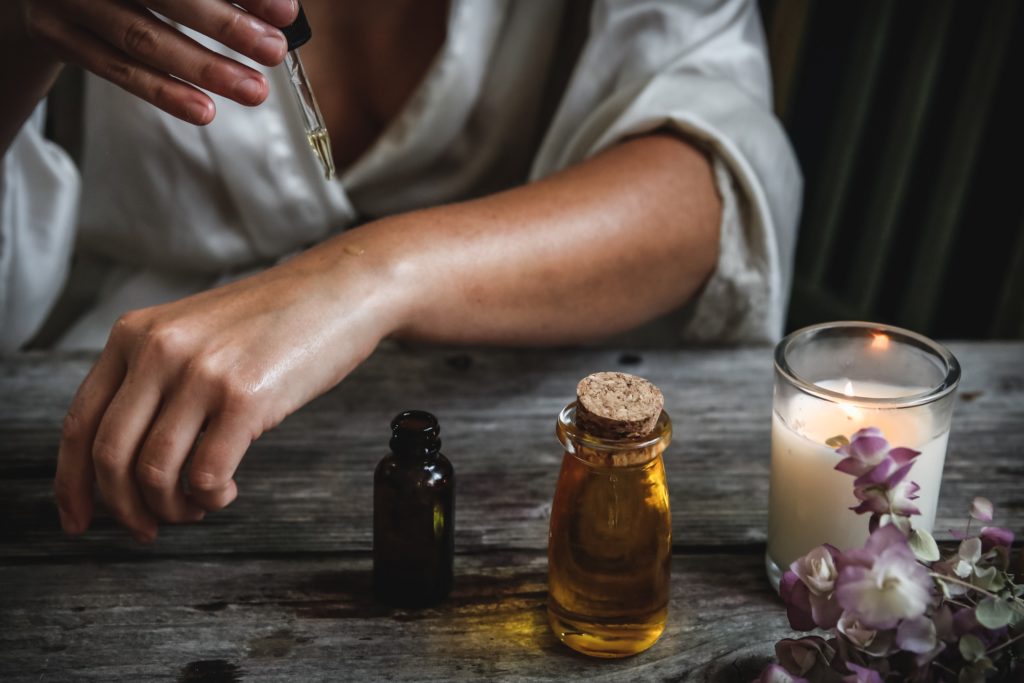Here’s How Lavender Oil Can Soothe and Heal Your Skin

When you think of lavender oil, your mind probably goes straight to the distinct sweet, floral smell (you either love it or you hate it). But lavender is so much more than just a fragrance. If you’ve been sleeping on lavender oil and are new to essential oils and natural ingredients, you might not know all that this all-purpose oil can do to benefit the skin. To find out the facts about the ingredient, we consulted board-certified dermatologists Anna Guanche, MD, of Bella Skin Institute in Calabasas, and Nava Greenfield, MD, of Schweiger Dermatology Group in Brooklyn.
FAST FACT
- TYPE OF INGREDIENT: Essential oil
- MAIN BENEFITS: Soothes skin, improves acne, protects against free radicals, and combats bacterial and fungal disorders.
- WHO SHOULD USE IT: In general, anyone with acne-prone skin who does not have a contact allergy to lavender or fragrance and does not have sensitive skin.
- HOW OFTEN CAN YOU USE IT: Provided you do not have an allergy to the ingredient, lavender oil is safe to use in your daily routine, and how often it is used depends on the type of product.
- WORKS WELL WITH: it can be diluted in a carrier solution, such as a fatty oil. “When lavender is mixed with coconut, jojoba, or grapeseed oil, it has wonderful benefits on the skin,” Guanche says.
- DON’T USE WITH: Inform your doctor of any medications you’re taking or products you’re using before trying lavender oil.
What Is Lavender Oil?
Initial, a word about basic oils: These are concentrated fluids got from the sweet-smelling portions of plants, for example, the blossoms, roots, and leaves utilizing a procedure called steam refining, as per Guanche.
Lavender oil (otherwise known as Lavandula angustifolia) is a sort of basic oil that originates from the blossoms of the lavender plant, which develops in different locales, for example, France and Bulgaria.
Greenfield says its primary parts are linalool, linalyl acetic acid derivation, Lavandula, geraniol, and eucalyptol, which have antibacterial just as hostile to contagious properties.
Nonetheless, she calls attention to that, “considers have additionally exhibited that there is a wide range of sorts of lavender oil, and as a result of their diverse structure, they have distinctive concoction properties.”
Lavender oil is available in a concentrated form on its own (which should be stored in a cool, dark place) but is also used in creams, moisturizers, oils, and mists.
The route of entry into your body (through topical application, inhalation, or ingestion) will determine the effect that the lavender oil has.
According to Greenfield, applying topically will have the most benefit to the skin, inhalation can trigger sensory neurons in the olfactory system and can have neuro effects, and ingestion can have systemic effects if it’s absorbed in your gut and enters the bloodstream.
Advantages of Lavender Oil for Skin
“Science has as of late begun to assess the medical advantages that lavender oil contains,” Guanche says. “Regardless, there’s starting at now an abundance of verification to show its capacities, and it’s one of the most notable fundamental oils on earth.”
Below are the essential potential points of interest in this oil for skin.
- Secures against free radicals: As a cancer prevention agent, lavender oil may help ensure the skin against ecological stressors.
- Calms skin: Since microscopic organisms and growth on the skin frequently bring about irritation, Greenfield says the counter parasitic properties can have against tingle and mitigating impacts.
- Improves skin breakout: Thanks to its antibacterial properties and calming impacts, Guanche says lavender oil could add to the improvement of skin breakout.
- Advances wound mending: Guanche focuses to look into that shows lavender oil may speed the recuperating of consumes, cuts, scratches, and wounds, and may likewise help with scarring.
- Forestalls diseases: It has been utilized to forestall contaminations and battle bacterial and parasitic scatters, as per Guanche, and this investigation demonstrated it to have a fungicidal impact.
Reactions of Lavender Oil
Basic oils are exceptionally strong, so contact sensitivities to lavender oil are an unequivocal chance. “In the event that you by and large have delicate skin, it is a smart thought to dodge items with scents.”
With that stated, she includes that it’s commonly very much endured when utilized topically. Before spreading it all finished, Guanche suggests applying the oil on a little fix of skin on a region other than the face first to test for a response. Since eyelid skin will in general be extremely delicate to allergens, Greenfield likewise suggests dodging the eye territory.
“There isn’t sufficient data to know whether lavender is protected to utilize when pregnant or breastfeeding, so I recommend avoiding utilizing it right now,” Guanche says. It’s additionally critical to check with your doctor before ingesting lavender oil, as it is for the most part not suggested.
How to Use Lavandula Oil
According to Guanche, it’s safe to apply lavender oil directly to the skin (although that’s not the case for most essential oils), and you can also dilute it in a carrier substance for added benefits, absorption, and safety.
The dilution rate depends on the usage or method of application (i.e. steaming, toning, moisturizing, etc.) and your specific skin needs. As for a carrier substance, Guanche suggests mixing it with a fatty oil, such as coconut, jojoba, or grapeseed.
Greenfield says it can be added to almost any product, but she favors it in gentle, non-foaming, sulfate-free soaps and moisturizers, like a ceramide or hyaluronic acid emollient. In other words, don’t apply heavy body creams on the face, and use separate face and body cleansers.
Sharing is caring!







